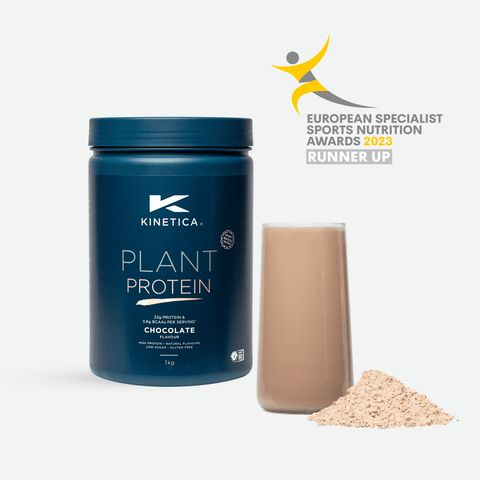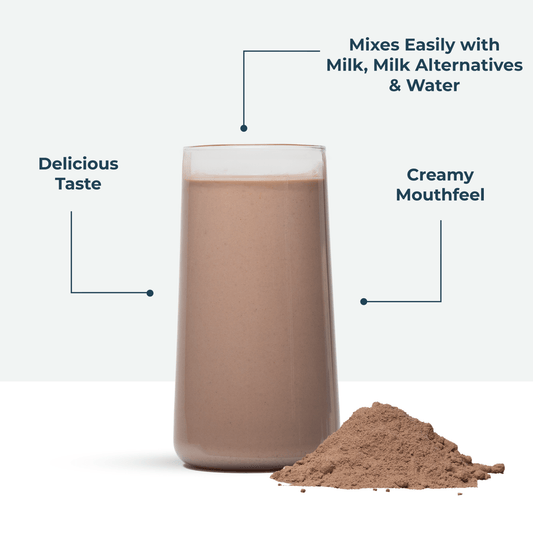Are Mass Gainer & Protein Powder The Same?

Whether you exercise regularly, or are looking at creating a stricter training regime, you’ve undoubtedly heard about different dietary supplements you can take to support your fitness goals. However, how do you know what ones are right for your needs?
In this article, we’re focussing on the following question: are mass gainer and protein powder the same? This is a common question for many people who are new to the world of supplements. Keep reading for the answer…
What is mass gainer?
Mass gainers, sometimes known as weight gainers, are designed to help you gain ‘mass’ as serving sizes are normally quite energy dense. This is useful when you’re looking to increase muscle mass, as a calorie or energy surplus is beneficial. Therefore, pairing a mass gainer with a resistance exercise training plan can help you increase your muscle mass and add bulk to your frame.
As well as being rich in calories, mass gainers have a high macronutrient content, consisting of a mix of carbohydrates, proteins, and fats. Additional vitamins and minerals may be added to provide extra nutritional support.
So, with this in mind, what is mass gainer used for, and how can it help your training?
Within the sports and exercise industry, mass gainer is perfect for those who struggle to meet their caloric needs through food alone. For example, certain sporting disciplines often require participants to go through a ‘bulking’ stage, like rugby, where they need to put on mass from early on in their career.
At Kinetica Sports, our Oatgain Mass Gainer is high in carbohydrates and protein, but is also nutrient-rich. Our Oatgain is formulated to be high in B vitamins, many of which help the body break down and use energy from the foods we eat1, including:
- Thiamin (B1)
- Riboflavin (B2)
- Nicotinamide (B3)
- Pyridoxine (B6)
In addition to this, our Oatgain High Calorie Gainer is low in sugars, with only 6.3g per 160g serving, a feature that makes it stand out from others on the market. Our Oatgain formula uses the relatively low GI (glycaemic index) of oats2 to ensure you get a stable source of energy from your mass gainer.


Buy Kinetica Sports Oatgain Mass Gainer now
What is protein powder?
Protein powder is arguably one of the most studied nutritional supplements available, and has become a staple within the exercise and fitness industry. But what is it, and how can it be used to complement a training routine?
The most common type of protein powder on the market is whey protein. This is a liquid derivative of the cheesemaking process, which is then filtered and dried to create the protein powder you’re more familiar with.
However, there are vegan alternatives made from products like pea, soy, and rice. These alternatives are also ideal for those who are sensitive, or have an intolerance to lactose (which is a sugar commonly found in dairy products).
Interested in learning more? Explore our article on What is Whey Protein and Why Do We Need it?

Shop Protein Powders Now!
But why is protein powder useful as a supplement alongside an exercise plan?
Protein is used within the body for a whole variety of processes, from making and regulating hormones to stimulating the growth and repair of cells. It is this last function in particular that makes protein supplements so useful for those with an exercise regime.
When you exercise, you create small micro tears in your muscles. Your body fixes these with proteins. These proteins support recovery and also facilitate adaptation to the exercise you’re doing, improving your fitness levels and muscle gain depending on the training at hand. According to research review papers, by supplementing a resistance training programme with protein powders, you can give your body more of what it needs to help increase your muscle mass and strength3.
For more information about what to look for in a protein powder, check out our Whey Protein Buying Guide.
At Kinetica Sports, we have a fantastic selection of protein powders to suit your training style. Our Whey Protein powders have a brilliant 22-23g of protein per scoop, and 5.54g of essential BCAAs to help supply your body with everything you need during training. We also have a Clear Whey that boasts 24g of protein per scoop and offers a refreshing taste.


Buy Plant Protein Powder today!
Alternatively, for those who want a plant-based alternative, you can match these strengths with our Plant Protein powder, as it contains 23g of protein as well as being dairy and gluten-free. It’s also naturally low in sugar.
What are the key differences between mass gainer and protein powder?
In this next section we’re going to dive into the key differences between mass gainer and protein powder. As identified above, these are clearly different supplements, but what are the main properties that distinguish them in their own right?
Ingredient composition
One primary difference between mass gainer and protein powder is the ingredient composition and ratio. Knowing and understanding the ingredient ratios within your dietary supplements is essential because this will help you decide which one is the right fit for you.
Serving size
The first thing to note is that, when comparing the serving sizes of protein powders and mass gainers, a lot more of the latter is recommended. This is to ensure you’re getting an energy dense serving to support your goals.
On the other hand, 1-2 scoops per serving of protein powder is usually more than enough to support your training. This is because protein powder has a lower calorie content, as the main objective is to support your protein needs.
Protein content
Unsurprisingly, when it comes to protein content, protein powder will always win out over mass gainer. When you look at the amount of protein per serving, both provide you with a substantial amount. However, when comparing them like-for-like, you’ll notice that protein-only powders provide more protein per 100g. In other words, protein powders contain more protein than mass gainers do.
Whilst both are rich in this essential macronutrient, protein powder is specifically formulated to offer you a high protein boost to your regular diet. This helps to repair and grow your muscles after exercise and promote lean muscle mass growth.
On the other hand, whilst mass gainer has elevated levels of protein to encourage muscle growth, it is not the main function of the supplement. As such, it has a different ratio of protein to other macronutrients.
Carbohydrate content
This leads us nicely to the next point, which is the carbohydrate content of each supplement. The majority of protein powders are relatively low in carbohydrates and sugars, with the focus more on incorporating extra protein into a balanced diet.
Alternatively, mass gainers have a high carbohydrate ratio because they’re intended to help you gain mass. By adding more carbohydrates to the mix, you can easily increase the overall calorie content. This is split between a combination of simple and complex carbohydrates to give you energy and increase your overall gains and energy intake.
At Kinetica Sports, our Oatgain Mass Gainer uses a blend of ground oats and maltodextrin to provide you with a high carbohydrate ratio. Maltodextrin is a type of simple carbohydrate that is quickly absorbed by the body, which gives you access to a fast source of energy.
Oats are complex carbohydrates which take the body longer to digest, offering you a more steady release of energy.
Learn more about the simple and complex carbohydrates of mass gainers in our What is Mass Gainer? Article.
To complete the macronutrients, the fat content is also normally higher in mass gainers to support their calorie-dense characteristic.
Use
Another key factor that separates mass gainer and protein powder is their intended use. As we’ve mentioned throughout this article, protein powder is primarily focused on helping you meet your protein needs, support your recovery and training adaptation. This is perfect for everyone from weekend warriors to professional athletes who want to support their training and reach their fitness goals.
Mass gainer, on the other hand, is designed to help you gain weight (which can be incorporated into a muscle growth programme), or assist in meeting your energy needs if you’re someone who struggles to do this through food alone.
Think of an athlete with a hectic training load, or someone who is looking to increase lean mass but struggles to maintain their weight. A mass gainer can help them increase their caloric intake in a controlled manner.

Mass gainer or protein powder: which one should you use?
With all this in mind, it’s clear that mass gainers and protein powders can play a valuable but separate function in your diet. Depending on your goals, a high-quality protein powder or mass gainer, like those from Kinetica Sports, can be a valuable addition to your diet.
To help you choose which supplement may be best for you, ask yourself the following questions?
- Do you struggle to meet your energy needs in line with your goals, whether it’s to support performance or build lean mass? If answering yes, mass gainer may be a better option for you as it contains more calories per serving.
- Are you aiming to put on weight and increase your bulk? In these cases, a mass gainer is more suitable.
- Do you want to increase your lean muscle mass? You’ll need to choose between the two based on your energy needs.
- Are you looking for a supplement to help you during recovery after an injury? Research suggests additional protein can help with rehabilitation after an injury, which makes protein powder valuable during recovery. Additionally, whilst meeting your energy needs is still important when injured, consuming these through fluids or supplements can make it easier to overconsume. This is because your energy needs will have lowered compared to times when you’re training regularly.
Remember that both mass gainer and protein powders are dietary supplements, not meal replacements, and they must be taken as part of a balanced diet. If you ever have questions, consult a qualified nutritionist or dietitian before embarking on a new diet.
Can you take mass gainer and protein powder together?
One of the most common questions when it comes to mass gainer and protein powder is whether they can be taken together. The short answer here is yes, technically, you could take both of these supplements as part of your diet plan.
However, the more important element to consider is whether it’s worth taking them both? Mass gainers and protein powder supplements are designed for different needs, which means the circumstances you would use them will vary (as we explained above).
Instead of taking both, you’re much better off choosing a dietary supplement that will support your end goals and use it effectively to complement your training programme.
Why choose Kinetica Sports for your supplements?
At Kinetica Sports, we always aim to offer you the best quality dietary supplements to support you in achieving your goals. That’s why we batch test all of our products independently through the Informed Sport programme to ensure they can be consumed by athletes at the highest levels.
We also make sure all of our products are compliant with the strict WADA (World Anti-Doping Agency) standards - so you can trust Kinetica Sports to help you reach your goals.
Shop mass gainer and protein powder at Kinetica Sports UK today.
For more information and insights about sports supplementation, explore the Kinetica Sports blog…







